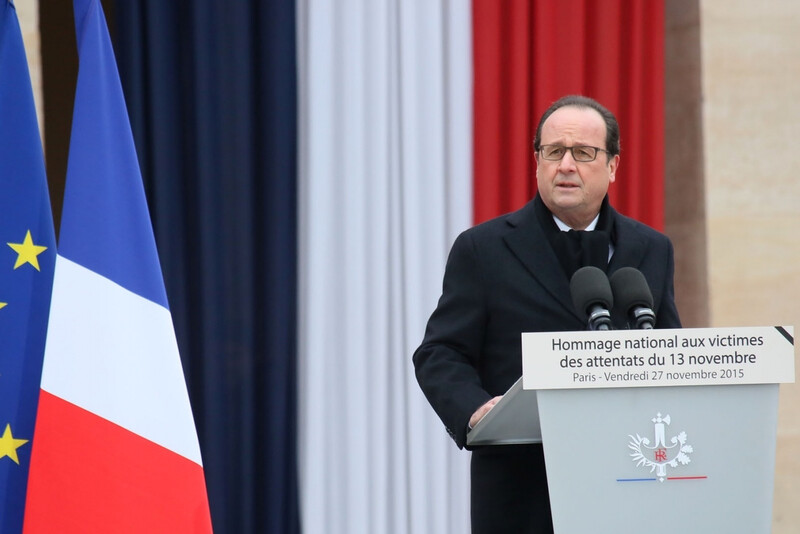Rights and Accountability 23 December 2015

President François Hollande is taking France down a path well trodden by other repressive regimes.
Presidency of FranceFrance is to push ahead with constitutional changes that Amnesty International is warning “would put many people at even greater risk of human rights violations” by giving authorities a free hand to close down organizations, conduct unwarranted house raids, shut mosques and restrict people’s freedom of movement.
A lawmaker from the ruling Socialist Party has likened one proposed change to a Nazi-era policy used against Jews.
If the amendments are approved, Amnesty says, they would “allow authorities to continue using state of emergency measures for a further six months after the end of a state of emergency.”
On Wednesday, the French cabinet approved the draft measures, including a controversial provision allowing the government to strip French citizenship from dual nationals born in France who are convicted of terrorism offenses.
The measure was first proposed by President François Hollande after suspected Islamic State gunmen killed 130 people in Paris on 13 November.
“We must be able to strip the French citizenship of any person convicted of attacking the fundamental interests of the nation or of an act of terrorism, even if he is born French,” Hollande told parliament.
Vichy
French law already allows citizenship to be stripped from foreign-born naturalized French citizens.
But just days ago, Justice Minister Christiane Taubira had predicted – wrongly – that the measure to expand this power to French-born citizens would not be included in the constitutional reform package.
According to Taubira, the president’s proposal “poses a major problem with respect to a fundamental principle, the right of the soil” – a legal term referring to the right of anyone born in a state to nationality or citizenship – to which the minister said she was “profoundly attached.”
French Prime Minister Manuel Valls “knows that this measure will not discourage a single terrorist, but will produce two classes of French citizens,” Yasser Louati, spokesperson for the anti-Islamophobia group CCIF tweeted.
Pascal Cherki, a lawmaker from the president’s ruling Socialist Party, has gone even further.Cherki, whose family is of Algerian Jewish ancestry, said the measure, long demanded by the far-right Front National, would be ineffective at deterring terrorism.
But he noted that the only time the French state had ever employed such a measure was when the collaborationist Vichy regime set up by the Nazi occupation during the Second World War stripped the citizenship of French Jews in Algeria.The Vichy regime stripped citizenship from more than 15,000 citizens in France, half of them Jews, as well as from all 110,000 Jews in French-ruled Algeria.
These measures were reversed after France was liberated, though for thousands of Jews deported to Nazi extermination camps that was too late.
CRIF, the umbrella for Jewish organizations in France and the country’s main Israel lobby group, has strongly backed the president’s measure.
Permanent emergency
Under the state of emergency declared after the 13 November attacks, French authorities have carried out 2,700 house searches without warrants and placed hundreds of people under house arrest, Amnesty states.
This included 24 environmental activists who were placed under house arrest for the duration of the recent Paris summit on combating climate change.
There are now fears that the government’s warnings that it will treat criticism of Zionism, Israel’s state ideology, as anti-Semitism could presage even harsher repression of Palestine solidarity activists.
Amnesty said that many people have described how house raids “have left them traumatized.” They have been given no explanation for the search or what authorities were looking for.
“My father had heart problems, he had just been released from hospital. Police forced the entrance door, they did not ring the bell, they burst into the flat, started screaming and handcuffed both my father and my sister,” Nadia, whose father is 80 and lives with his disabled daughter, told Amnesty International researchers after a raid on 21 November.
“My father felt unwell and after a few minutes fainted. They had to call an ambulance. He was so scared, he cried a lot when we visited him at the hospital the first days,” Nadia added.
“Declaring a state of emergency in situations where there is a ‘threat to the life of the nation’ such as the Paris attacks is one thing, but entrenching emergency measures to counter more vaguely defined threats is another,” Gauri van Gulik, Amnesty International’s deputy director for Europe and Central Asia, said.
“Many people are being targeted solely on the basis of their religious practices or vague suspicions,” van Gulik added.
Less than a year after the slogan “Je suis Charlie” was used to proclaim that freedom of expression was the highest value and that terrorists could never force France to restrict it, the Hollande administration is taking the country down a path well trodden by many other repressive regimes.
The government’s proposals to amend the constitution will be debated by parliament in February.
To become law they must be passed by a three-fifths majority of a special joint session of both houses, or be approved in a referendum.





Comments
Civil Rights a thing of the past, World Wide.
Permalink James Myles Head replied on
Our Congress and Senate has slipped those on American citizens for the last thirty years that way it was painless!
Vive la liberte egalite et
Permalink Stavros replied on
Vive la liberte egalite et fraternite. LOL.
Proposed change to French constitution
Permalink legal eagle replied on
La Republique est morte. Vive la dictature.
Oui Legal Eagle, rien n'est
Permalink Tess replied on
Oui Legal Eagle, rien n'est plus sur!